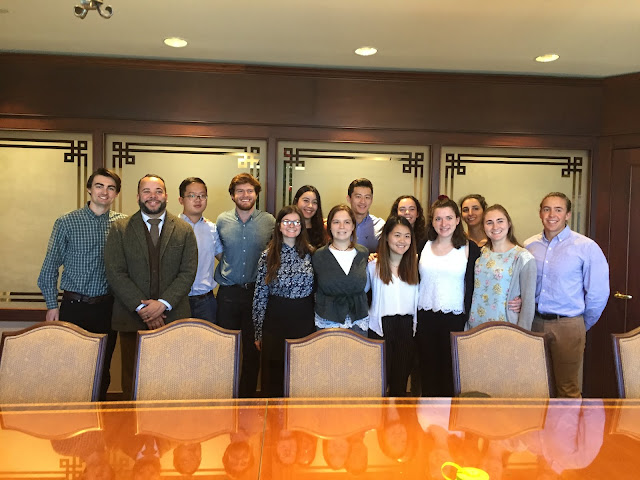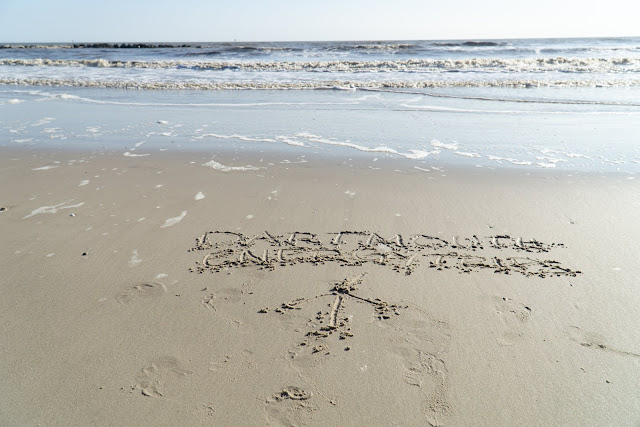New Orleans, Day Two
Politics and Nonprofits: Recovery, Resilience, and Retribution
We spent today in New Orleans, visiting Louisiana state senator J.P. Morrell and a non-profit called Coastal Communities Consulting. After waking up bright & early and a quick French breakfast at the hostel, we headed over to meet Senator Morrell in a high-rise building located in downtown New Orleans. After passing through security, we entered a room with sweeping views of the city and the Mississippi River. The meeting was structured as a discussion, which was framed around our questions about Louisiana’s social and environmental policies. Morrell told us about many of the issues that Louisiana faces, and perhaps one of the most pressing is how easily New Orleans floods given that the city is below sea level. Even minor flood events can be disastrous for residences and businesses, and Morrell described how the city’s infrastructure is still very vulnerable to these events. As we asked more questions, Senator Morrell warmed up to the group and shared his stories in his years of being in the state legislature. As a father and also a lawyer, it was fascinating to hear about all that Senator Morrell accomplished in his past two terms.
As someone who is not very familiar with the intricacies of politics/governmental affairs, meeting with Senator Morrell and hearing about his stories forming state legislature was really eye-opening. It was really interesting to hear about the most pressing issues of the state from a macro level. Senator Morrell described politics like a game of musical chairs: when the music stops (the music being the term that a politician is elected for), one must look for another chair to fill. Looking ahead, Morrell emphasized a likely shift towards renewables in the city of New Orleans. He described a tremendous increase in international investment in the renewable energy sector, which is increasing research & development and creating new capital equipment in the renewables industry.
After the meeting, we grabbed lunch in the city. A group of us went to Mother’s, a local Creole restaurant famous for their po’ boys and Southern fare. After getting full from shrimp po’ boys and gumbo, we headed to Coastal Communities Consulting (CCC), a non-profit organization that “provides technical assistance, economic development, social support services, and continued disaster assistance to rural entrepreneurs and their families” (from the CCC website) in the commercial fishing industry. We heard from Sandy, who is the CCC executive director and who has a deep connection to the industry, as the daughter of a commercial fisherman and a co-owner, along with her husband, of a commercial fishing business. Sandy told us about the Gulf Coast fishing industry, which is the third largest industry in New Orleans. It is an industry of many immigrants, who come to the region for the sunny, warm weather and join the fishing industry because there is a lower language barrier than elsewhere. Sandy then told us about the effects that disasters like Hurricane Katrina and the BP oil spill can have on the fishing industry and community livelihoods.
Because many of the fishermen don’t know about the grants and loans that are often available to assist with disasters like hurricanes and oil spills, Sandy’s business addresses a unique community need of helping these fishing communities apply for and receive benefits from these assistance programs. In the aftermath of Hurricane Katrina, Sandy said that she alone had secured $23 million of recovery aid for the coastal communities. The entirety of it all was confusing to me – the programs didn’t consider the very people they were supposed to benefit, as it seemed that these assistance programs didn’t address the fact that many local fisherman lacked the awareness and technical knowledge required to apply for assistance, which is often an online process.
As Sandy continued to talk about the disaster recovery programs, I recognized the complexity of the entire process. There are often many social and political dynamics happening behind these governmental and corporate assistance programs. While these programs are often perceived as “solutions” to the disasters, in some cases these assistance programs actually worsened tension between community members, as in one case certain fishermen benefited more than others because what started to matter for fishermen to receive assistance were the social connections that one had, rather than more objective factors. Therefore, our system of government and economic drivers had made it difficult for communities to be resilient to natural and man-induced disasters. Although hearing Sandy’s stories of working with these fishing communities made me feel a little hopeless about making solid, meaningful change, they were also a source of inspiration. After all, it is only after we learn about and understand problems that we are able to create positive change.
Our meeting with Sandy was our last scheduled event of the day, so after that we had some free time! Some of us decided to go downtown to grab some ice cream after a long day of learning and absorbing lots of information. After having some bubble tea and rolled ice cream, we headed to dinner at Maïs Arepas, a Columbian restaurant next to our hostel, with Professor Elizabeth Wilson, who had just arrived earlier today. We shared trip highlights of the past few days with Professor Wilson over delicious corn arepas paired with a variety of salsas. Then after dinner, a group of us decided to go to a Preservation Hall jazz concert and explore the French Quarter. It was certainly a busy day, but we learned so much and even managed to explore some of New Orleans after!
--Amber Liu '20
--Amber Liu '20





Comments
Post a Comment